Conference Speakers

Amit Ahuja
AMIT AHUJA is Associate Professor of Political Science at University of California, Santa Barbara. His research focuses on the processes of inclusion and exclusion in multiethnic societies. He is the author of, Mobilizing Marginalized Citizens: Ethnic Parties without Ethnic Movements (forthcoming, Oxford University Press). He is currently working on his next booK, Building National Armies in Multiethnic States. He is a recipient of the Margret T. Getman Service to Students Award in 2015.
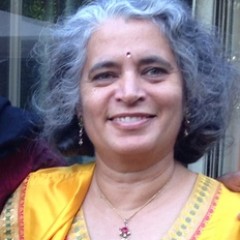
Jyoti Bachani
JYOTI BACHANI is Associate Professor of Strategy and Innovation at Saint Mary's College of California. She has been a Fulbright Senior Research Scholar to India, Editor-in-Chief of Emerald Emerging Markets Case Study Collection, Past-President of Western Casewriters association and board member of North American case Research Association. Her research interests are in the area of strategy making in purpose driven organizations in technology, nonprofit, and Indian contexts. She has authored an Academy award winning case-study on Rainwater Harvesting by Indian tribals, and one book on Strategy Making in Nonprofit Organizations, in addition to several academic articles, case-studies and book chapters, along with two co-edited forthcoming books on Humanistic Management. She translates Hindi poetry for global audiences, and likes to hike and dance.
More About Jyoti Bachani
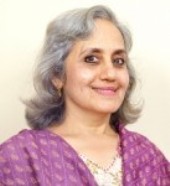
Rajni Bakshi
RAJNI BAKSHI is a Mumbai-based author. Her books include: Bazaars, Conversations and Freedom: For a Market Culture Beyond Greed and Fear (Penguin, India, 2009 and Greenleaf, UK, 2012), which won two Vodafone Crossword Awards; Bapu Kuti: Journeys in Rediscovery of Gandhi (Penguin, India, 1998), which inspired the Hindi film Swades starring Shah Rukh Khan. Her monographs include Trusteeship: Business and the Economics of Well-being (2016); Civilizational Gandhi (2012). She is currently on sabbatical from her role as Gandhi Peace Fellow at the Gateway House, Indian Council on Global Relations. She serves on the Boards of Child Rights and You (CRY), Citizens for Peace, and the Centre of Education and Documentation (Mumbai & Bangalore), and on the Executive Committee of the Gandhi Smriti & Darshan Samiti.
More About Rajni Bakshi

David Blundell
DAVID BLUNDELL received a doctorate in Anthropology from UCLA. He serves as anthropology and language editor for the Electronic Cultural Atlas Initiative Austronesia Team at UC-Berkeley where he supervises interdisciplinary GIS projects. He has conducted ethnographic research across South Asia since the 1970s. Based on his research, Blundell directed and filmed, Arising Light: Dr. B. R. Ambedkar and the Birth of a New Era in India, which received the United Nations 2014 Vesak Day Award for Best Documentary. Currently he is developing a new curriculum for teaching the anthropology of religion using the life experiences of Dr. Ambedkar. He offers courses at UCLA Extension.

Hiram E. Chodosh
HIRAM E. CHODOSH is the president of Claremont McKenna College. A recognized innovator in higher education, with expertise in comparative law and international justice reform, he has published several books and articles on mediation, legal reform, and comparative law. Recently, he co-authored Uniform Civil Code for India: A Blueprint for Scholarly Discourse (Oxford University Press, 2016). Chodosh has worked in more than 20 countries in Asia and the Middle East to advance judicial reforms with organizations that include the World Bank, the International Monetary Fund Legal Department, and numerous court systems, non-profits and national commissions. Chodosh has been recognized for the impact of his justice reform efforts. In 2011, he received the Gandhi Peace Award, and in 2012, the National Jurist magazine named him one of the 25 most influential legal educators.
More About Hiram E. Chodosh
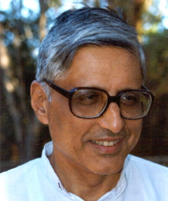
Rajmohan Gandhi
RAJMOHAN GANDHI is an author, historian, biographer a peace-builder, and a grandson of Mahatma Gandhi. Currently a visiting professor at the Indian Institute of Technology, Gandhinagar, and at Michigan State University, East Lansing, MI, he was until 2012 a professor at the University of Illinois at Urbana-Champagne. He has authored more than a dozen books, including Why Gandhi Still Matters (2017); Understanding the Founding Fathers (2016); Mohandas: a True Story of a Man, his People and an Empire (2008); Ghaffar Khan: Nonviolent Badshah of the Pakhtuns (2004); Revenge & Reconciliation: Under-standing South Asian History (1999); Eight Lives: A Study of the Hindu-Muslim Encounter(1987). He served as a member of the Indian parliament (1990-92), and led the Indian delegation to the UN Human Rights Commission in Geneva.
More About Rajmohan Gandhi
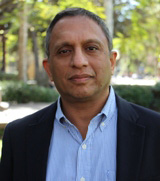
Akhil Gupta
AKHIL GUPTA is Professor of Anthropology and Director, Center for India & South Asia (CISA). He is the author of Red Tape: Bureaucracy, Structural Violence, and Poverty in India (Duke Univ. Press, 2012), which was awarded the Ananda Kentish Coomaraswamy Prize by the Association for Asian Studies (2014); Postcolonial Developments: Agriculture in the Making of Modern India (Duke Univ. Press, 1998). He is editor of Culture, Power, Place (with James Ferguson; Duke Univ. Press, 1997); Anthro-pological Locations (with James Ferguson; Univ. of California Press, 1997); Caste and Outcast (with Gordon Chang and Purnima Mankekar; Stanford Univ. Press, 2002), The Anthropology of the State (with Aradhana Sharma; Blackwell, 2006); and The State in India After Liberalization (with K. Sivaramakrishnan; Routledge, 2010). His current research includes, Business Process Management (BPM) and Call Centers in Bangalore, and questions of infrastructure and corruption. He is the President-Elect of the American Anthropological Association.
More About Akhil Gupta
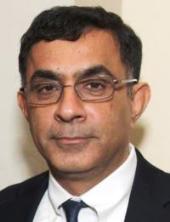
Devesh Kapur
DEVESH KAPUR is the Director of the Center for the Advanced Study of India (CASI) and Professor of Political Science at University of Pennsylvania where he holds the Madan Lal Sobti Chair for the Study of Contemporary India. His recent books (co-authored/co-edited) include, Rethinking Public Institutions in India (OUP, 2017); Navigating the Labyrinth: Perspectives on India’s Higher Education (Orient Blackswan, 2017); The Other One Percent: Indians in America (OUP, 2016); Defying the Odds: The Rise of Dalit Entrepreneurs(Random House, 2014). His book, Diaspora, Development, and Democracy: The Domestic Impact of International Migration from India (Princeton University Press, 2010), earned him the 2012 ENMISA Distinguished Book Award. Professor Kapur is a recipient of the Joseph R. Levenson Teaching Prize (2005) awarded to the best junior faculty at Harvard College.
More About Devesh Kapur
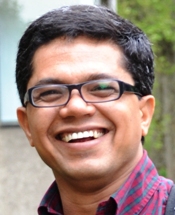
Prakash Kashwan
PRAKASH KASHWAN is Assistant Professor in the Department of Political Science at the University of Connecticut, Storrs. His research focuses on the comparative politics and political economy of environment and development. He is the author of Democracy in the Woods: Environmental Conservation and Social Justice in India, Tanzania, and Mexico (OUP, 2017). His research has been published in journals such as Ecological Economics, Regional Environmental Change, Global Environmental Politics, and in popular media forums including the Washington Post. He was among the winners of 2009 Young Scientist Research Award from the International Foundation for Science (IFS), Stockholm.
More About Prakash Kashwan
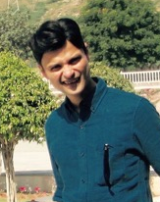
Aishwary Kumar
AISHWARY KUMAR is Assistant Professor of History at Stanford University. A political theorist and intellectual historian of South Asia, Empire, and the Global South, Kumar's work engages a wide spectrum of issues in moral and political philosophy, constitutional theory and political religion, and the history of global political thought. He is particularly interested in the relationship between freedom, sovereignty, and political justice. Kumar’s first book, Radical Equality: Ambedkar, Gandhi, and the Risk of Democracy (Stanford University Press, 2015), was listed by The Indian Express among the 15 most important books published on politics, morality, and law. He is now working on his second book, A Different Force: Ambedkar’s Critique of Violence. Kumar has received fellowships in Germany, Switzerland, and the United Kingdom.

Cynthia Lukas
CYNTHIA LUKAS is a film producer and writer of transformative and inspirational documentaries celebrating the oneness of humanity. In 2004 she co-founded with Kell Kearns a non-profit educational media organization, Heaven on Earth Creations. Together they have co-produced six acclaimed documentaries about global oneness and nonviolence. Their most recent films are two documentaries on Gandhi. Gandhi’s Gift (2016) focuses on his final years of life, and Gandhi’s Awakening (2017) about his transformational years in South Africa. Cynthia presents these documentaries at conferences, schools and spiritual centers around the world.
More About Cynthia Lukas
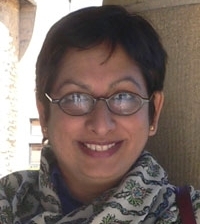
Purnima Mankekar
PURNIMA MANKEKAR is professor in the departments of Gender Studies, Asian American Studies, and Film, TV, and Digital Media at UCLA. Her areas of specialty include feminist media studies and ethnography, affective publics, South Asian and South Asian American Studies. Her most recent book was Unsettling India: Affect, Temporality, Transnationality (2015, Duke University Press). She is currently completing a manuscript titled Future Tense: Affective Labor, Capital, Technology (in collaboration with Akhil Gupta), and is also working on a book on affective publics and television in India. She is the initiator and convener of an international and interdisciplinary consortium of scholars from University of Melbourne, JNU, and NUS (Singapore) on a collaborative project titled Publics on Edge which examines the transnational circulation of ideas of crisis and panic across specific geopolitical sites.
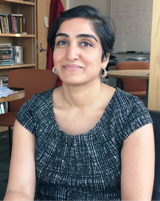
Karuna Mantena
KARUNA MANTENA is Associate Professor of Political Science at Yale University and Co-Director of the International Conference for the Study of Political Thought. Her first book, Alibis of Empire: Henry Maine and the Ends of Liberal Imperialism (Princeton University Press, 2010), analyzed the transformation of the nineteenth-century British imperial ideology. She is currently working on a book project on M.K. Gandhi and the politics of nonviolence, tentatively titled Gandhi’s Realism: Means and Ends in Politics. She received her Ph.D., at Harvard University, and her BSc at the London School of Economics.
More About Karuna Mantena
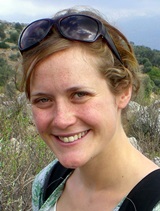
Eleanor Newbigin
ELEANOR NEWBIGIN is Senior Lecturer (Associate Professor) in the history of modern South Asia at SOAS, University of London. Her research focuses on the practices of citizenship in India, especially during the subcontinent’s transition to independence. She is author of The Hindu family and the emergence of modern India: law, citizenship and community (Cambridge University Press, 2013) as well as a number of journal articles and book chapters. Her recent most publication is on Public Finance and Personal Law in Late Colonial India.
More About Eleanor Newbigin

Elyse Petersen
ELYSE PETERSEN is an advocate for transparency in the global food system and works with farmers to improve the quality of their products and access market opportunities. As the Founder of Tealet, she has made direct trade available to small-scale farmers, businesses, and consumers around the world. She is a food scientist and returned Peace Corps volunteer that is committed to building a sustainable future for agriculture and communities. She has a B.S. in Food Science and Technology from Cal Poly Pomona and a Japanese-MBA from the Shidler College of Business, University of Hawaii.
More About Elyse Petersen

Anastasia Pilisvsky
ANASTASIA PILIAVSKY is Newton/Leverhulme Early Career Fellow at the Centre for Research in Arts, Social Sciences and Humanities (CRASSH), and Fellow of Girton College, University of Cambridge, where she serves as the Director of Studies in Social Anthropology. In a recently edited book, Patronage as Politics in South Asia (Cambridge University, Press, 2014), she argued that patronal bonds, which are normally thought to corrupt democratic politics, in fact constitute the long-valued foundations of India’s democratic life. She is currently writing a book about the hierarchical foundations of Indian democracy. She received MSc/DPhil in Social Anthropology at the University of Oxford as a Rhodes Scholar and a Wenner-Gren grantee.

Srinivas Reddy
SRINIVAS REDDY is a scholar, translator and musician. He trained in classical South Asian languages and literatures at Brown University and the University of California, Berkeley. His books include Giver of the Worn Garland: Krishnadevaraya’s Amuktamalyada (Penguin 2010), The Dancer and the King: Kalidasa’s Malavikagnimitram (Penguin 2014) and The Cloud Message: Kalidasa's Meghadutam (Penguin 2017). His current project for Juggernaut Books is a biography of the Vijayanagara emperor Krishnadevaraya. Srinivas is also a concert sitarist and has given numerous recitals around the world. He now lives in Rhode Island and teaches at Brown University.
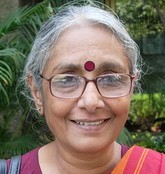
Aruna Roy
ARUNA ROY is a leading Indian Social and Political Activist and co-Founder of Mazdoor Kisan Shakti Sangathana (MKSS), a social and grassroots organization which spearheaded the Right to Information Movement leading to the Right to Information Act in India. She is the Chairperson of the National Federation of Indian Women (NFIW). She was honored with the Ramon Magsaysay Award for Community Leadership (2000), the Lal Bahadur Shastri National Award for Excellence in Public Administration, Academia and Management (2010), and the Rule of Law Award in the World Justice Forum in Barcelona, Spain (2011). She was listed as one of the 100 most influential people in the world by TIME Magazine (2011). She was Professor of Practice at the ISID, McGill University (2016) and the George Soros Visiting Practitioner Chair at the School of Public Policy, European Central University (Spring 2017).
More About Aruna Roy

Ornit Shani
ORNIT SHANI is Senior Lecturer (Associate Professor) in Asian Studies, University of Haifa, Israel. She is the author of Communalism, Caste, and Hindu Nationalism: The Violence in Gujarat (Cambridge University Press, 2007); How India Became Democratic: Citizenship and the Making of the Universal Franchise (forthcoming, Cambridge University Press), which uncovers the greatest experiment in democratic history: the creation of the electoral roll and universal adult franchise in India. She is a recipient of the Israeli Science Foundation (ISF) Grant for her sequel project: ‘Embedding Democracy: the Social History of India’s First Elections.’ Ornit received her PhD from the University of Cambridge.
More About Ornit Shani
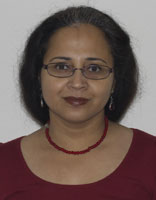
Aseema Sinha
ASEEMA SINHA is Professor of Political Science, the Wagener Chair of South Asian Politics, and George R. Roberts Fellow at Claremont McKenna College. She is a Fulbright Scholar (2016-2017) and was a Visiting Fellow at IDSA in New Delhi, 2016-2017. Her books include Globalizing India: How Global Markets and Rules are Shaping India's Rise to Power (Cambridge University Press, 2016); The Regional Roots of Developmental Politics in India: A Divided Leviathan (Indiana: Indiana University Press, 2005), which received the Joseph Elder Book Prize in the Indian Social Sciences. Her articles have appeared in the British Journal of Political Science, World Development, Polity, Comparative Political Studies, Comparative Politics, Business and Politics, Journal of Democracy, and India Review.
More About Aseema Sinha
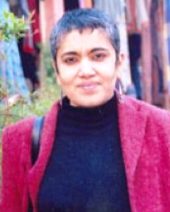
Mrinalini Sinha
MRINALINI SINHA is Alice Freeman Palmer Professor in the Department of History, and Professor (by courtesy) in the Departments of English Language and Literature and Women’s Studies at the University of Michigan, Ann Arbor. She is the author of Colonial Masculinity: The Manly Englishman and the Effeminate; and Specters of Mother India: The Global Restructuring of an Empire, which received the Albion Book Prize, awarded annually by the North American Conference on British Studies and the Joan Kelly Memorial Prize awarded annually by the American Historical Association. Her current project, “Complete Political Independence: The Curious History of a Nationalist Indian Demand,” explores the contingency of the development of the nation-state form in India. Professor Sinha is the past President of the Association for Asian Studies. She serves on the advisory boards of several journals.
More About Mrinalini Sinha
